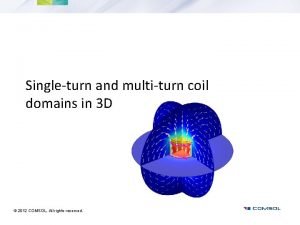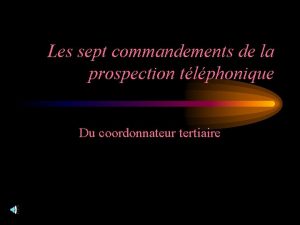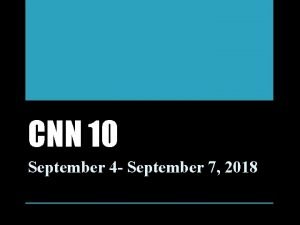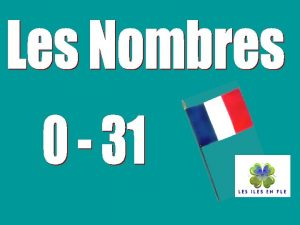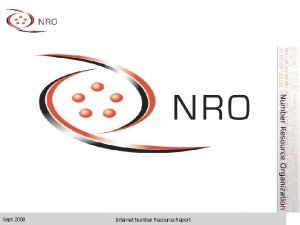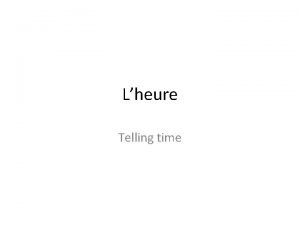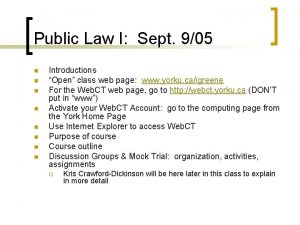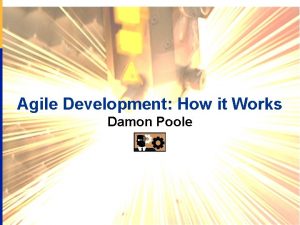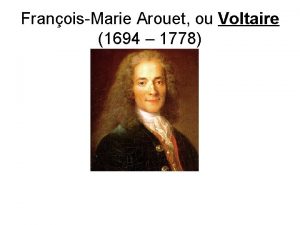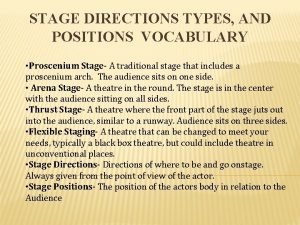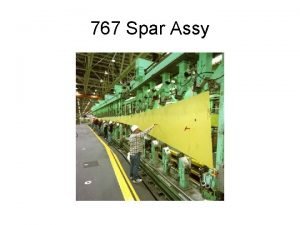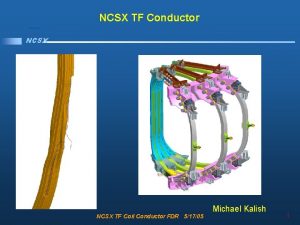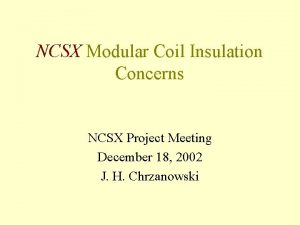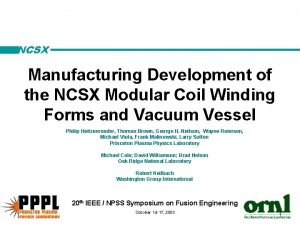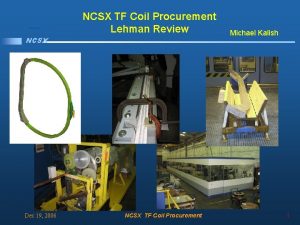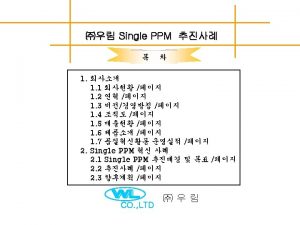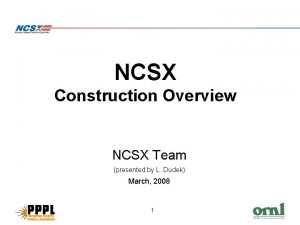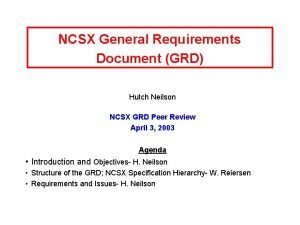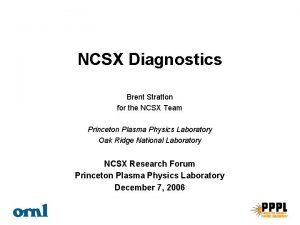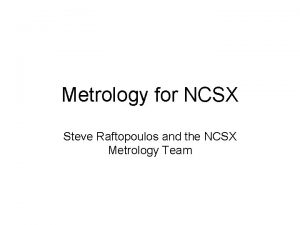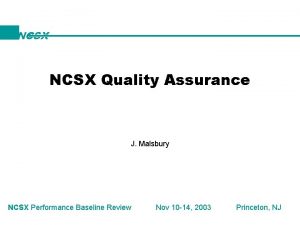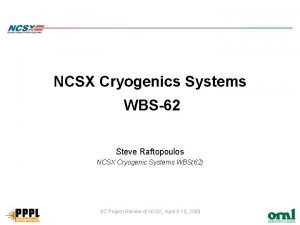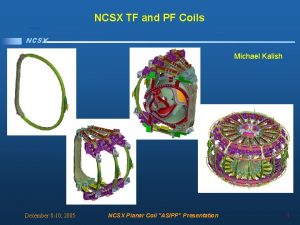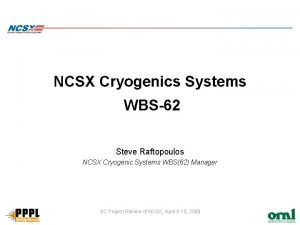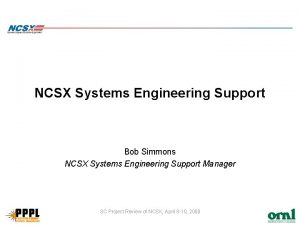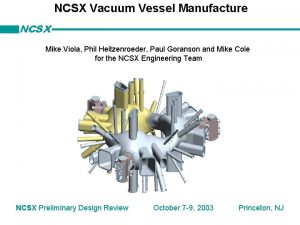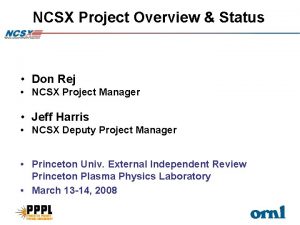NCSX STAGE 2 COIL TO COIL ASSY SEPT


















- Slides: 18

NCSX STAGE 2 COIL TO COIL ASSY SEPT 20, 2006 T. Brown, M. Cole, P. Fogarty, P. Goranson, K. Freudenberg, D. Williamson

AGENDA • • 3 POINT POSITIONING SUPPORT – Mike Cole BOLT REAMING – Paul Goranson SHEAR PLATE – Kevin Freudenberg WING SUPPORTS – Dave Williamson 20 September 2006 Stage 2 Coil to Coil Assy

3 Point Positioning Support Requirements • Position Winding Center within a TP of. 020 inch. • Maintain electrical isolation between coils. 20 September 2006 Stage 2 Coil to Coil Assy 3

MCHP Assembly Sequence where flanges and spherical seats must come together…accurately. Type-A Type-B on A Stand repositioned to receive Type-C added along with supports 20 September 2006 Stage 2 Coil to Coil Assy 4

3 Point Positioning Support 20 September 2006 Stage 2 Coil to Coil Assy 5

The flange interface involves the need to accurately mate spherical seats and inclined flange surfaces that are separated by shim material. • Can shims be accurately machined and located? • Can glass epoxy be used to take up misalignment? Mold release on flange surface Shim geometry is formed from MC developed surfaces rather from individual curves. Separate curves would be better. 20 September 2006 Stage 2 Coil to Coil Assy 6

Will we be cutting and machining individual SS shim pieces? Where tapped holes do not exist on flanges can spring pins be used to hold metal shim in place? Individually machined SS wedges. Thin layer of glass epoxy insulation. How thin, 15 – 30 mil ? Can uncured glass epoxy (placed or pumped in) be used to take out the shim alignment imperfections? Will it meet the flange load capacity? 20 September 2006 Stage 2 Coil to Coil Assy 7

Sphere Proposed new alignment method. Flat 1. 5” Ø “V” 20 September 2006 Stage 2 Coil to Coil Assy Switch from aligning three spheres to aligning a sphere, flat and “V”. 8

An alignment hole is need in the flat and “V” spherical seats to locate an alignment sphere, used for locating the mating sphere. 20 September 2006 Stage 2 Coil to Coil Assy 9

PROBLEM: How do you align the spherical seats when the shim surfaces are making contact at the same time? 20 September 2006 Stage 2 Coil to Coil Assy 10

Uses spring loaded seats! We’ve added a pop up system to aid alignment. Keyed interface prevents rotation. Adjustable Position for Final Shim Compression Initial Alignment Position Option 1 20 September 2006 Stage 2 Coil to Coil Assy Fixed 11

Option 2 Alternate approach for establishing a spring loaded interface Keyed interface prevents rotation. Three or four captured precision compression springs provides an additional 3/8” extension above flange shims to aid alignment. 20 September 2006 Stage 2 Coil to Coil Assy 12

How does the A-to-A interface set-up effect the flange assembly? Left side Right side The left side is rotated over the VV and placed ¾” from its final position and supported from the roller system below. The right side is rotated to within ¾” of its final position and held by the crane. The left side is then moved to its final position via rollers and the right side mates with the spherical seats via the crane system. 20 September 2006 Stage 2 Coil to Coil Assy 13

With no shims in place the MC position is verified with metrology measurements. Left side 20 September 2006 Stage 2 Coil to Coil Assy Right side 14

13”gap Left side fixed at -0. 75” to alignment plane Right side backed to Step 32 Once metrology is verified the right side is backed off 13” via crane and secured from below. The flange shim system is installed and then the device is reassembled and metrology rechecked. This sounds okay, will it work? Backing off 13” involves an inclined moment with little rotation. 20 September 2006 Stage 2 Coil to Coil Assy 15

3 Point Positioning Support Issues • Selection of 3 point support mechanism • Ball and Socket only vs Flat, “V”, & Socket • Variations include Spring loaded vs static. • Determining Shim thickness & size • One piece vs more than one piece 20 September 2006 Stage 2 Coil to Coil Assy 16

Extra slides follow 20 September 2006 Stage 2 Coil to Coil Assy 17

Early coil design with spherical seat machined into flange of winding form 20 September 2006 Stage 2 Coil to Coil Assy 18
 Multi turn coil
Multi turn coil Sept comme setteur questionnaire
Sept comme setteur questionnaire Sept commandements
Sept commandements Ectomy examples
Ectomy examples 7 mountains of jerusalem
7 mountains of jerusalem Cnn 10 sep 7
Cnn 10 sep 7 Un deux trois quatre cinq six sept huit neuf dix
Un deux trois quatre cinq six sept huit neuf dix Sept
Sept Le blaireau sans gene de yvon danet
Le blaireau sans gene de yvon danet Sept heure moins le quart
Sept heure moins le quart Deportes
Deportes I sept
I sept Ecrivez les sept jours de la semaine
Ecrivez les sept jours de la semaine Accu poole sept
Accu poole sept Candide ou l optimisme
Candide ou l optimisme Downstage and upstage
Downstage and upstage Upstage vs downstage
Upstage vs downstage Stage right stage left diagram
Stage right stage left diagram Arena
Arena
